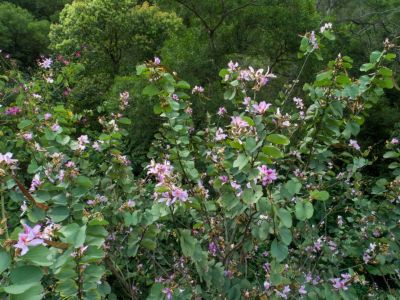Orchid Tree Info
The Anacacho orchid tree is a member of the pea family and while some authorities claim it hails from the tropical and subtropical areas of India and China, south Texans claim it as their own. It is found growing wild there in two distinct locations: the Anacacho Mountains of Kinney County, Texas and a small area along the Devil’s River where this orchid tree is also known as Texas Plume. Due to the natural adaptations of the orchid tree, culture has spread to other desert areas where xeriscaping is a must. Growing orchid trees are easily recognized by their twin lobed leaves, which have been described as butterfly-like or Texas style– like the print of a cloven hoof. It is semi-evergreen and will keep its leaves throughout the year when the winter is mild. The flowers are lovely, reminiscent of orchids, with five-petaled white, pink, and violet blossoms that arrive in clusters fairly continuously from late winter to early spring, depending on the species. After that, the Anacacho orchid tree will rebloom occasionally after a heavy rain.
Information On Orchid Tree Culture
If you live in USDA Hardiness Zones 8 to 10, you should be asking about how to grow an orchid tree as care of these beauties is as easy as digging a hole in the ground. Reaching only 6 to 10 feet (2-3 m.) tall with a spread of about 8 feet (2 m.), these trees are moderate to fast growing. Their many trunked forms make them ideal as specimen plants or container grown patio trees. They are attractive to butterflies and honeybees, but are deer resistant. It has no serious disease or insect problems. Orchid tree culture is fairly straightforward. Growing orchid trees thrive in full sun and do well in bright shade. They must have well drained soil and when planting an orchid tree, care should be taken to place it outside the reach of a sprinkler system. Orchid trees, once established, can withstand drought conditions, but cannot tolerate temperatures below 15 degrees F. (-9 C.).
Orchid Tree Care
If you live in Zone 8a, you may want to give your orchid tree care and protection against a south wall and mulch around it just in case an unusually harsh winter occurs. There are a few extra things you can do that would fall under how to grow an orchid tree, but these are normal maintenance tasks for any gardener and not particular to the Anacacho orchid tree. In summer, water your tree at least once a week, but in winter, cut back to every four to six weeks and only if it doesn’t rain. Trim off any unsightly or leggy growth after the blooms fade and, of course, prune out any dead, diseased, or broken branches any time of year. Cut off any shoot growth from the trunk base if you want to keep the classic tree form. Some people prefer to allow their orchid tree to take on a more shrub-like appearance, in which case, leave those shoots alone. It’s strictly up to you. The final direction for how to grow an orchid tree would be to plant it where it can be seen blooming in all its glory. It’s a show not to be missed.
